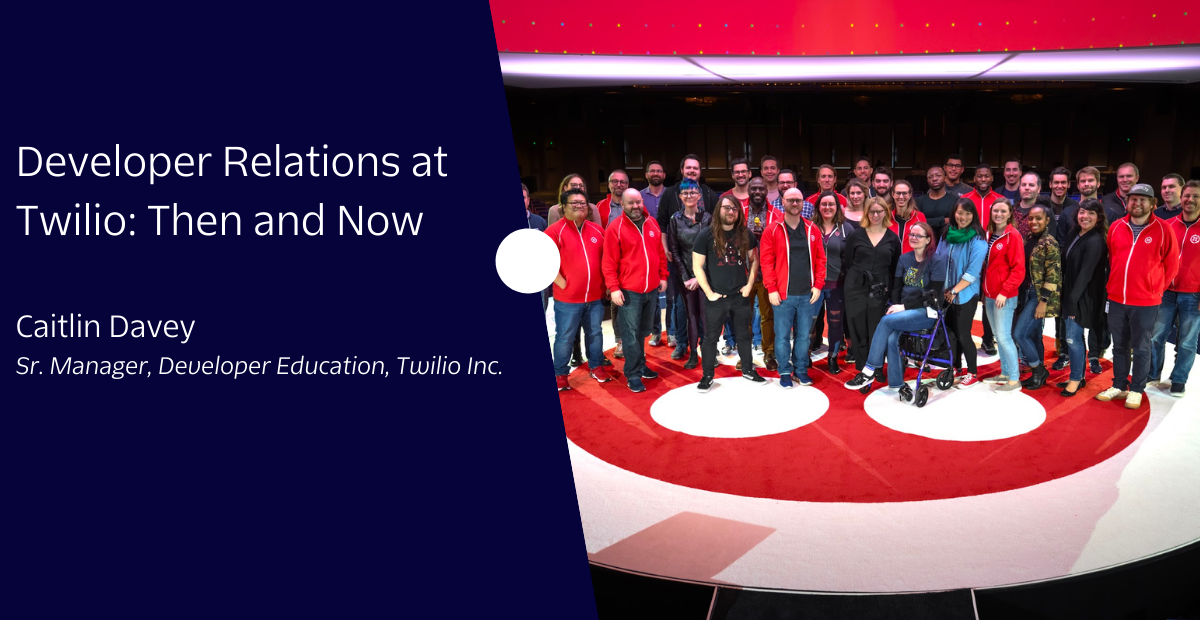Developer Relations at Twilio: Then and Now
Time to read:

Twilio’s Developer Network (DevNet) team evolved from the developer relations work that began when Twilio was still in its early startup days. Our early evangelists were generalists presenting at conferences, writing code, authoring documentation, and connecting with their local developer community. As the team grew, a need for greater role specialization emerged. And so, the DevNet was created to better organize the work happening across teams within Twilio.
Many of the early DevNet’s functions and responsibilities were shared, and ownership rotated through all of the evangelists. However, that became untenable as we scaled, and when Twilio formally created the Developer Network it started with three core teams: Developer Education, Evangelism, and Community.
As we scaled, we added new roles to focus on reaching developers in different communities and channels, specialized across different types of content. We’ve now grown to include five teams working in distinct ways to serve anyone who wants to build with Twilio. These groups include: Worldwide Developer Relations, Developer Enablement, Builder Content, Community Experience, and Ecosystem Evangelism.
The day-to-day for each team in the DevNet may look vastly different, however, we share a common goal of inspiring and empowering builders with Twilio.
How we work together
When still a small team, each evangelist would work relatively isolated in their respective geographic region or developer community. Quarterly, they’d gather at events called team summits to share insights from work happening on the ground. Summits allowed team members to present, collaborate, and learn from each other while maintaining a bond that allowed a fully remote team to operate together. The DNA of these meet-ups carried over into the formation of DevNet.
As our team has grown, more intention is required to remain collaborative. Team summits—even virtual ones—remain a key way for our large group to share ideas, collaborate, and have fun together.
We also continue to make time to learn something new! From pizza-making to clay-shaping, learning something together remains a traditional aspect of summits.

How the DevNet net-works
The choice of “Network” as a name was intentional – and it definitely still fits our crew. The name reflects the concept that every developer is a node in a network. We’re trying to establish connections with—and among—nodes of developers. For example, while evangelists primarily connect with developers in their regions through events, the documentation team mainly connects with developers through content.
The team continues to take a multi-threaded approach to connecting with communities of builders across the globe today. The five mission-oriented groups of teams in the DevNet today include:
- Worldwide Developer Relations - The mission of Worldwide Developer Relations is to inspire and equip developers around the globe to build the future of customer engagement. They do this by directly engaging with the developer audience in different regions through channels like live events and webinars.
- Developer Enablement - The Developer Enablement team challenges and empowers developers to build the future of communications. They do this by creating Twilio’s documentation, training, an educational video game called TwilioQuest, and demos.
- Builder Content - The Developer Content team rallies developers to build the future of communications. They craft their own tutorials and blog posts as well as help review and edit others’ posts to grow our community awareness.
- Community Experience - This Community Experience acknowledges and empowers individuals in the Twilio community who inspire and equip developers. They reach developers through platforms, tools, videos, streams on Twitch, and programs. A prime example is the Twilio Stack Overflow Collective!
- Ecosystem Evangelism - Ecosystem Evangelism targets builder and developer audiences within key customer segments though strategic programming and direct engagements. This team connects with startups and enterprises alike to help them build with Twilio through hackathons, events, and content.
As builders and developers like to gather in different areas and communities, each group leverages different channels to reach the community where they are.

Looking ahead
As we think about the future of developer relations (both at Twilio and across the industry), we’re ultimately thinking about how to serve developers and builders better – wherever they may be. .
Are there developer communities forming that we can support? Are there places developers are gathering – online or off – we can join? Are there groups of underrepresented developers that we can help amplify to the global developer community? How can we make the developer community more inclusive for anyone who wants to build, even if it isn’t with Twilio?
These are just a few of the questions we think about on the Developer Network here at Twilio. And if you’re interested in the work that the DevNet does or could see yourself helping in one of the Developer Network roles, check out the open roles in our group!
Caitlin Davey is a Manager of Developer Education on the Developer Enablement team. She is an educator interested in supporting training in technology through informal learning experiences. She can be reached at cdavey [at] twilio.com
Related Posts
Related Resources
Twilio Docs
From APIs to SDKs to sample apps
API reference documentation, SDKs, helper libraries, quickstarts, and tutorials for your language and platform.
Resource Center
The latest ebooks, industry reports, and webinars
Learn from customer engagement experts to improve your own communication.
Ahoy
Twilio's developer community hub
Best practices, code samples, and inspiration to build communications and digital engagement experiences.

